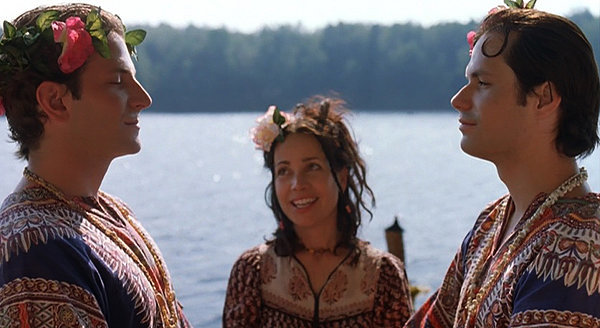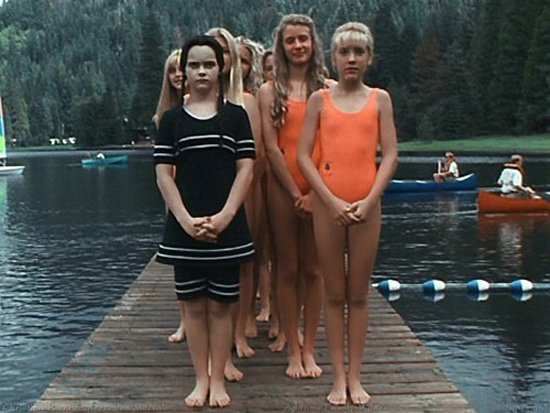How Does “Wet Hot American Summer: First Day of Camp” Build on a Tradition of American Camp Films?
Summer camp is an American institution. Many countries around the world have summer or “vacation” camps for kids, but it’s hard to surpass the popularity and ubiquity of camps in the USA and Canada. In a number of countries, summer camps are often education-oriented or help kids learn other languages (like English) or immerse them in the culture and history of their own country. The majority of summer camps in North America are far less focused. There are of course specialized camps for things like the performing arts, science and technology, nature, sports, travel, weight loss, and religion, but “camp” is primarily a place that isn’t school. I went to sleep-away Jewish summer camp for 6 years, from age 8 to 13. We had religious services every Friday night and Saturday morning, and all the food was Kosher (not that we ate it anyway), but other than that it was just camp. It was the place that I learned to love roller coasters because my counselors literally forced me on one (like lifted me up and put me on) during our annual trip to Dorney Park, the place I got a weird long-lasting nickname, and the place I had my first kiss (with a redhead behind the canteen). These coming-of-age events and quirky occurences are the heart of the summer camp stories that films and TV often try to portray.

The most absurdly accurate and accurately absurd summer camp film of all time is Wet Hot American Summer (2001), which has been followed up this year with Neflix’s television prequel Wet Hot American Summer: First Day of Camp (2015), using the same actors and characters as if no time has passed. Both the film and the TV show incorporate almost every aspect of being at camp from talent shows and scary legends about haunted cabins to white water rafting trips and counselors who genuinely don’t care. Yes, Wet Hot American Summer is ridiculous (hysterically ridiculous), but hyperbole is a very accurate tool in depicting what genuinely goes on at camp. Camp is full of endless stupid inside jokes, naked shower fights (for both boys and girls), and large groups of people literally breaking out in song. Perhaps it’s the unification, or the haven for underdogs, or the freedom from rules, or the great outdoors, but something about camp feels uniquely American, and a slew of American camp films have given it a strong resonance in our shared culture.

The original summer camp movie is Meatballs (1979), starring Bill Murray in one of his first-ever roles. It is the story of Camp North Star, the Bad News Bears of the camping world, facing off against the fancy rich kids from Camp Mohawk who like to cheat. In the end Camp North Star wins, of course, because they embrace the philosophy that their head counselor Tripper (Bill Murray) imparts: indifference. With their unified stance, Camp North Star chants “It just doesn’t matter!” all the way to the winner’s circle. The idea of ”Who cares? It’s camp” is one of the important principles of summer camp and really shapes the mindset of campers and counselors alike. Camp is a place that simply has, or is supposed to have, fewer rules. It is removed from society. What you do there won’t affect your status back at school or with your friends from home. At my summer camp I was friends with a bunch of kids who I went to school with, but once we were back at school we didn’t even speak. This idea that there are no consequences in camp somehow brings people closer together - that and living with them in a bunk for 8 weeks.
The theme of people coming together is exemplified most potently in The Parent Trap (1998), in which two twin sisters separated at birth with no knowledge of other miraculously meet at Camp Walden in Maine and plan to get their parents back together. But camp isn’t just about people in general coming together. Camp stories specifically embrace the underdogs, the misfits, the weirdos, and the outsiders who congregate and then decide to take on the champs, the popular kids, the rich kids, or the adults. Films like Space Camp (1986), Camp Nowhere (1994), But I’m a Cheerleader (1999) and Addams Family Values (1993) all depict that aspect of camp quite well.

One of the stereotypes surrounding summer camp is that it’s just people having sex all the time. I was never a counselor at camp, but as far as campers go that rumor is unfortunately untrue. The film American Pie (1999), which propagated that rumor, presumes that no campers have more sex than those who go to band camp. I know that rumor is especially untrue as I also went to band camp and absolutely no one was having sex. But camp is a sexually-charged place. In many summer camps, the boys and girls are largely separated. All activities are separate, they live in separate areas of camp, and even eat separately. But, in my camp at least, there was one place where the opposite sexes could mingle, and that was at canteen. After evening activities, which usually consisted of a musical, tournament finals, or some other themed event, the campers would go to the canteen, where every kid was allotted one soda and one choice of candy. The older you were the longer you got to stay at canteen, which gave you more time to potentially hook up.
Films like Little Darlings (1980), in which two girls at camp bet on who can lose their virginity first, explore, in a nuanced and dignified way, the part sexuality plays in the transition from childhood to adulthood. Camp, despite being a place with “no rules,” has the potential to help kids learn some important life lessons - the kind of lessons that stick with you because you learned them on your own. Heavyweights (1995), about an all-boys weight loss camp run by a psychotic ex-fitness instructor (Ben Stiller), is a great example of how camp can teach valuable lessons, despite its relative insanity.
Wet Hot American Summer: First Day of Camp shows us that the great tradition of summer camp stories is still going strong, and camp retains its ever-powerful emotional pull for the American public.

